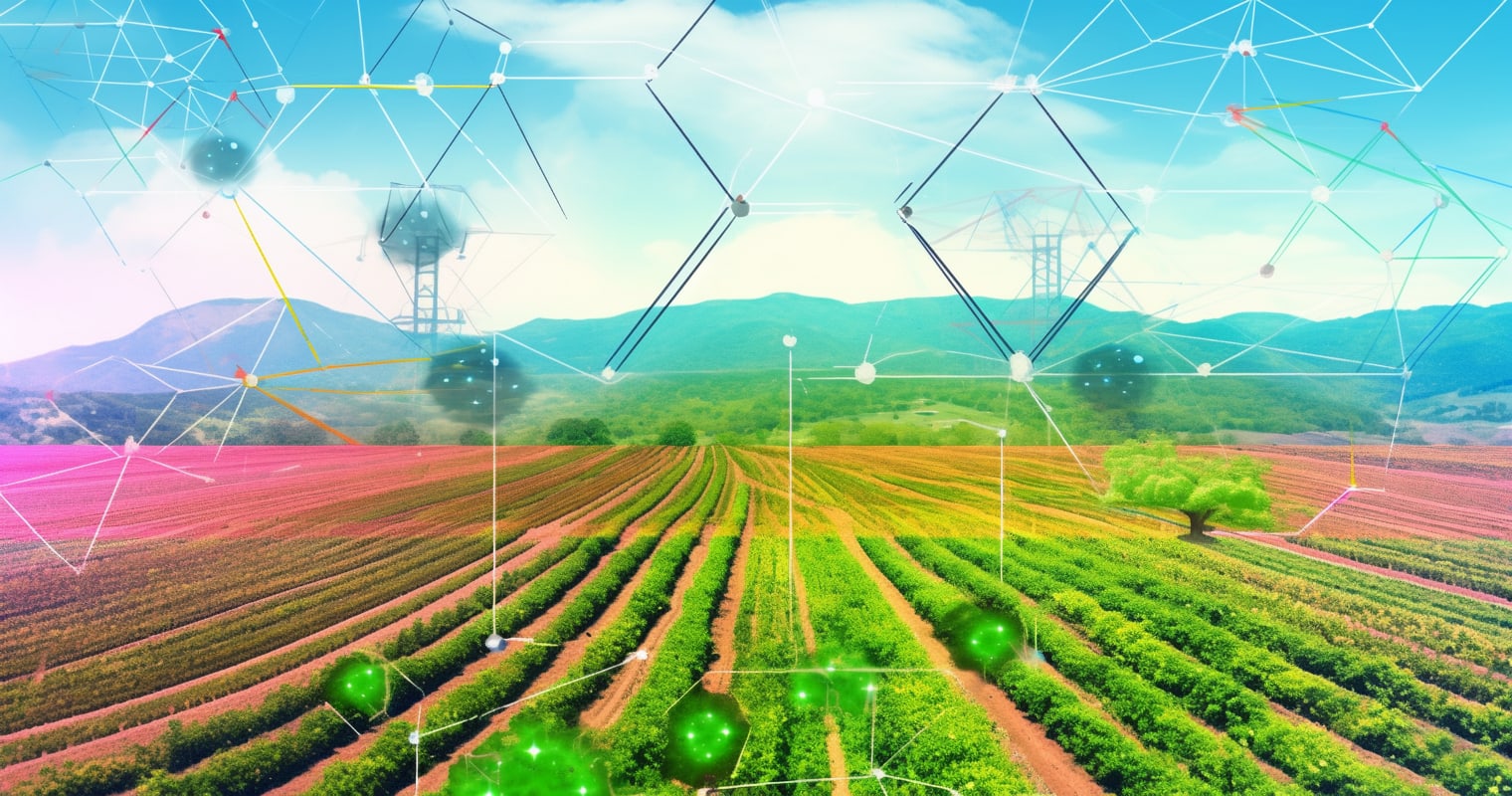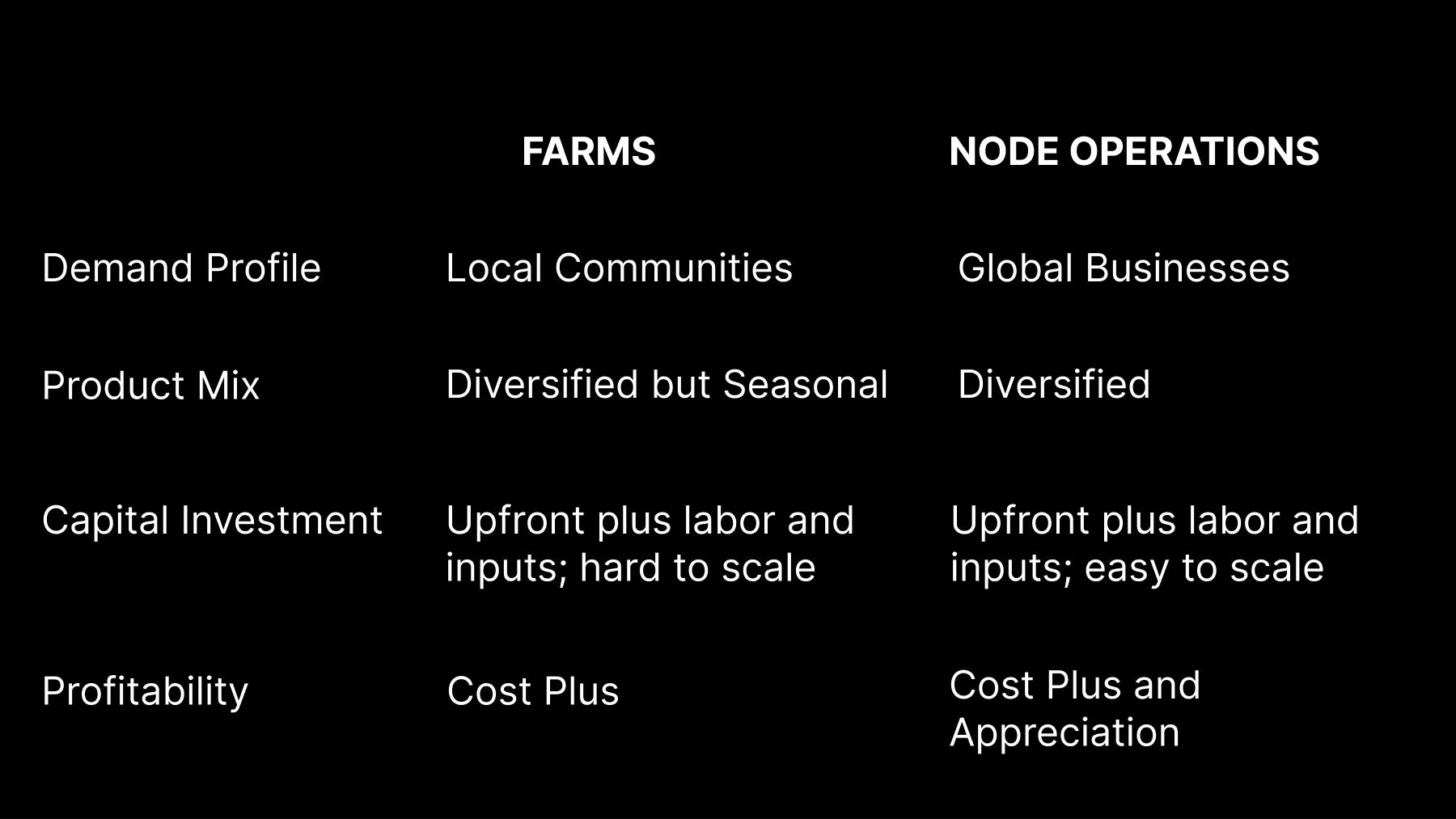Node Operators - A Return to Pre Industrial Farming for the Digital Age
Thursday, July 6th, 2023

Decentralization is unbundling and undoing the forces of industrialization which valued concentration of resources. This is a battle ground between the ideas of Kenneth Arrow and Friedrich Hayek[1].
What is one way that this can come to reality?
The rise and normalization of Node Operators are legitimate opportunities of entrepreneurship.
The closest back-of-the-napkin analogy I make is that Node Operators are like digital farmers from the pre industrial (pre conglomerate) era. The risk of this essay is that, in my ignorance, I am grossly idealizing the farmer, but here it goes.
My understanding of farming is that these were smaller, yet sustainable, often family-run businesses that required specialization. But they were vibrant participants in the market economy because nearby towns all required food. Yet because crops and food could become highly specialized, farmers could choose crops they specialize in which eliminated direct competition with farmers of different crops.
The benefit to the nearby society was that the competition that did exist protected them against price gouging; the proximity of farmers to their consumers and the broader ecosystem of other farmers helped them to maximize that what they made met demand; and the infrastructure had on-going returns (meaning, once they got the land, the major equipment, could extract additional yield potentially indefinitely as long as they covered maintenance costs and any inputs (seed, food, water)).
Farming as we know it now is highly centralized by conglomerates. These aren't smaller operations, anymore, but corporations that benefit from the economies of scale for better distribution and pricing. But Big Agriculture also creates some challenges from its centralization, such as supply chain risk, inhumane practices, and use of chemicals.
We see many downsides of centralized systems, and the question is open how the decentralized infrastructure will unfold.
Key to these are the Node Operators.

These are Dev Ops specialists who run the different kinds of node or computing services that would otherwise be run by a centralized organization in either their own data center or using a cloud provider.
The Node Operators don't do so altruistically. They are given an opportunity to turn their expertise in node operations, particularly around the blockchain infrastructure, into revenue.
Most of these, in these early innings, have been able to bootstrap themselves because of the speculative value behind the native tokens, which are given by some networks as rewards for being node operators.
The classic example is Bitcoin: miners secure the network and, in exchange, earn Bitcoins.
Not all networks provide incentives, and it's worth exploring in the future will non-incentivized networks survive but I don't know the answer right now.
I do know that for decentralization of services, all of which depend upon the decentralization of node operators who run the compute for the protocols, to succeed, the operators need to make money. Without those market forces, these highly skilled operators could just work for a company and make more.
So there are a bunch of unknowns, but the possibility is there.
If decentralized services become self sustaining and generate non-speculative income, but income for value added services, and that distribution of services are issued on the blockchain for verifiable services provided by node operators, we have a new form of farming.
The demand in this case are consumers; but instead of local families buying produce or meat, these can be global entities, most likely corporations, that purchases the use of the services. The value of locality could vary by the service. For example, there might be some cases where only those customers who are close geographically to the node provider, in which case, the node operators only benefit if demand is local. However, if the value comes from node providers being closer to customers of those who pay for the service (think of a decentralized CDN or video streaming service), then node providers benefit being closer to end-customers.
If we see a proliferation of different services, and within those services, different incentive models, we could see node operators acting like farmers with more than one crop: node operators build a portfolio of services their offer based on their markets and their expertise.
What is the equivalent of the land, crops and the equipment used by farmers?
The land in this case are the servers, whether they get them from a cloud provider or choose to save costs and perform the DevOps themselves.
The crops as mentioned above are the choice of possible blockchain services they want to work with. By adding more compute nodes (buying more land), a node operator can offer additional services and earn more income.
The equipment are often dependent upon the networks they work with. These are often the actual tools for monitoring their servers or providing the services for those that are more complex, like data indexing. I suspect these will continue to grow to simplify the process for node operators as more node operators join.
Unlike farming, where farmers could only tap into local demand, node operators can tap into global demand.
"The Use of Knowledge in Society" (1945 article) and "The Road to Serfdom" (1944 book) , core arguments around information quality via price signals, better decentralized incentives leads to efficiency, innovation, specialized market knowledge is highly dispersed, manage externalities better, market specialization offers scale benefits vs centralized scale ↩︎